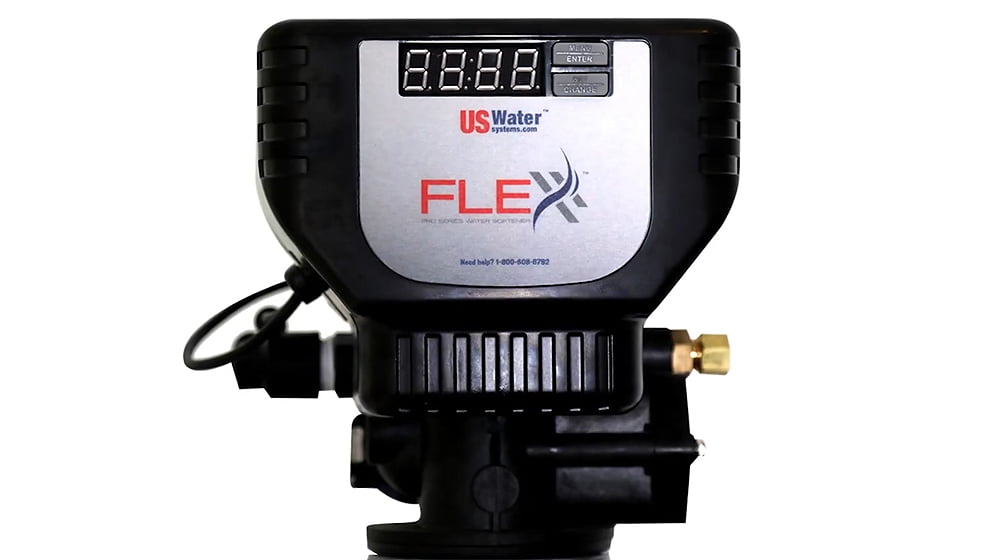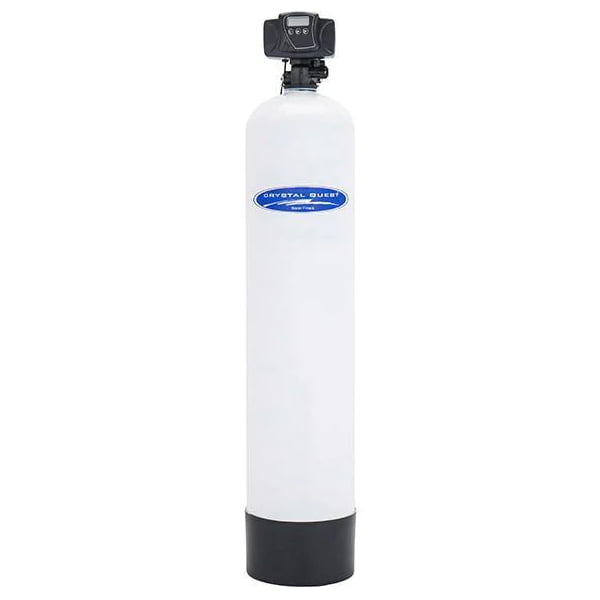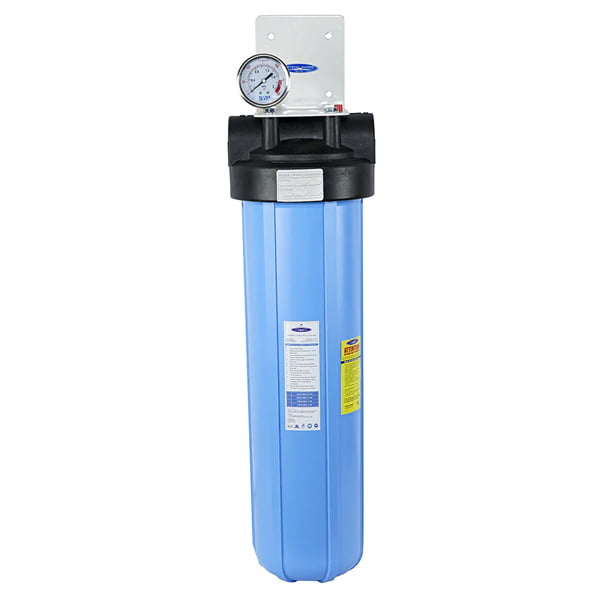7 Best Whole House Alkaline Water Filters (*Update 2024)
Written by: Alexandra Uta // Expert Fact-Checking: Buddhini Dolapihilla, MBSS // Last Updated: Jan 31, 2024
This page may contain affiliate links. If you buy a product or service through such a link we earn a commission at no extra cost to you. Learn more.
Whole house alkaline water filters balance water pH which protects plumbing and appliances from corrosion.
Plus, most systems will enrich your water with beneficial minerals that can also improve its taste.
But with so many models out there, how do you find the best whole house alkaline water filter for your home? Easy! This guide will help you find your ideal system at the lowest price.
No Time to Read? Check Our List of the Best Whole House Alkaline Water Filters!
| Product | Details | |
|---|---|---|
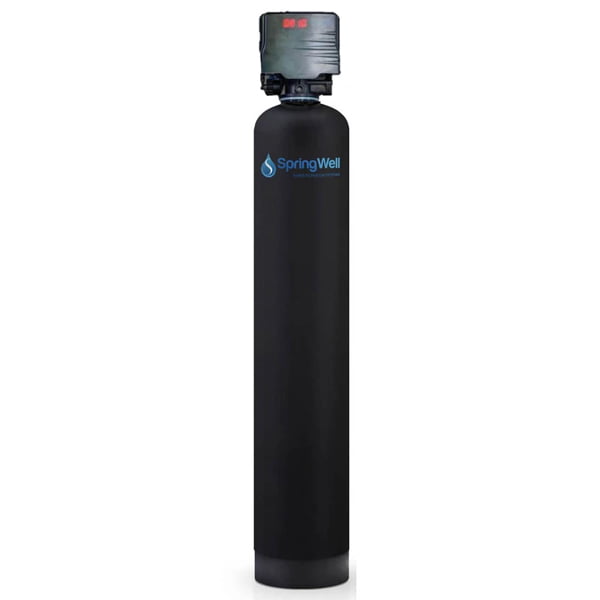 Best for Water pH 6.0 or Higher: SpringWell SCN1-6 |
Get 5% Off! Use Code: |
Price: $$ Type: Calcite Filter Feed Water pH: 6.0 or Higher Output Water pH: Around Neutral (7.0) Flow Rate: 12 gpm Read Review: Click |
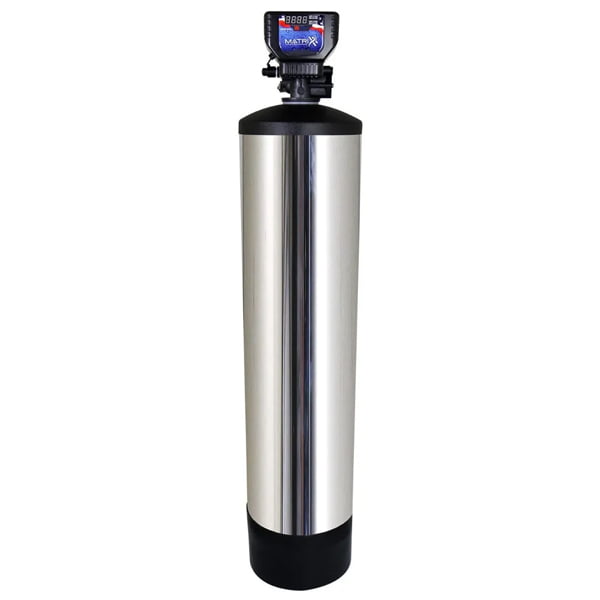 Best for Water pH 5.0 or Higher: USWS Matrixx |
Get 5% Off! Use Code: |
Price: $$ Type: Calcite + Magnesium Oxide Filter Feed Water pH: 5.0 or Higher Output Water pH: Around Neutral (7.0) Flow Rate: 10-20 gpm Read Review: Click |
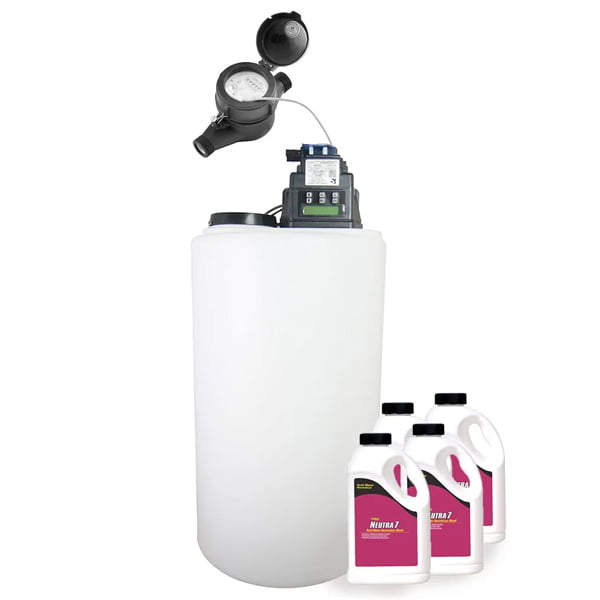 Best for Any Water pH: US Water Precision Injection System |
Get 5% Off! Use Code: |
Price: $$ Type: Soda Ash Injection System Feed Water pH: Any Output Water pH: Any Flow Rate: 1-50 gpm Read Review: Click |
 Best Budget Pick: Flexx Pro |
Get 5% Off! Use Code: |
Price: $ Type: Calcite + Magnesium Oxide Filter Feed Water pH: 5.0 or Higher Output Water pH: Around Neutral (7.0) Flow Rate: 10-20 gpm Read Review: Click |
Best Whole House Alkaline Water Filter Reviews
Our Top Picks
- SpringWell SCN1-6 – Best for Water pH 6.0+
- USWS Matrixx – Best for Water pH 5.0+
- US Water Precision Injection System – Best for Any Water pH
- Flexx Pro – Best for Low Budgets
- SoftPro – Best with NSF Certification
- Crystal Quest – Best for Alkalinization + Remineralization
- Crystal Quest Big Blue – Best Cartridge-Based
1. Best for Water pH 6.0 or Higher: SpringWell SCN1-6 Calcite pH Neutralizer
In our opinion, the best whole house alkaline water filter in 2024 is the SpringWell SCN1-6.
It’s ideal for acidic (well) water with a pH of 6.0 or higher. The filter raises overall water pH to neutral reducing metal leaching from pipes – think copper, lead, etc.

SpringWell SCN1-6 Calcite pH Neutralizer |
|
| Price: | $$ |
| Filter Type: | Calcite |
| Feed Water pH: | 6.0+ |
| Output Water pH: | ~7.0 |
| Water: | 12 Gallons Per Minute |
|
Our Rating
Get 5% Off! Use Code: |
|
Pros
- Whole house alkaline water filter turns low-pH water into balanced non-corrosive water.
- Protects your plumbing system and home appliances from leaks.
- Stops blue and green staining on fixtures.
- The natural calcite bed slowly dissolves calcium carbonate into the water as it flows through raising its pH.
- Calcite is self-limiting: It raises water pH to achieve a non-corrosive balance without going overboard and adding too much hardness.
- 12 gallons per minute flow rate for up to 4-6 bathrooms.
- Ready for DIY install – comes with detailed instructions.
- Built-in bypass valve.
- Low maintenance: Automated backwashing prevents packing of calcite bed to maintain high flow rates and keep calcite in perfect condition.
- Depending on water pH, chemistry and service flow, the Calcite needs to be refilled from time to time (usually 1-2 times a year).
- Easy to program and control thanks to Bluetooth head valve compatible with free mobile app.
- View current usage + historical data, adjust regen/backwashing settings, start cycles, etc.
- Lifetime warranty.
- 6 months satisfaction guarantee.
- Great customer service.
Cons
- Not for water pH below 6.0.
- Calcium carbonate (calcite) will increase water hardness and a water softener may be necessary for post-treatment.
Best for
The SpringWell SCN1-6 whole house alkaline water filtration system is best for neutralizing acidic water with a minimum pH of 6.0.
2. Best for Water pH 5.0 or Higher: US Water Systems Matrixx pH Balancing Filter System
In our opinion, the best whole house alkaline water filtration system for pH 5.0 or higher is the US Water Systems Matrixx.
Pros
- USWS whole house pH neutralizing system eliminates corrosion and leakage of copper and galvanized pipes, fixtures, and appliances. Plus, stops copper staining!
- If your water pH is 5.8 to 6.9, the USWS Matrixx comes with calcite media.
- Acidic waters slowly dissolves the calcium carbonate contained in calcite.
- Calcite balances water pH just right. It does not over-correct if applied right.
- Calcite is naturally occurring calcium carbonate made from white marble limestone – no chemicals used!
- For below 5.8, the pH neutralizing system comes with a blend of calcite and magnesium oxide.
- Both calcite and magnesium oxide are NSF as well as WQA certified and safe for consumption.
- 2 whole house alkaline water filter system sizes available:
- 081-MXF-PH-150 with 10 gpm flow rate for up to 3 bathrooms.
- 081-MXF-PH-250 with 20 gpm flow rate for 4+ bathrooms.
- No need to hire a plumber for installation if you are handy with tools, also thanks to built-in bypass valve.
- Vortech tank eliminates channeling for even water flow, increased capacity, and water savings when backwashing.
- Only requires periodic backwashing to maintain media bed and flow rates.
- Fully automated.
- Media needs to be refilled from time to time which is all that’s required for maintenance.
- Once or twice a year is a good average.
- Head valve is fully programmable without making the process overly complicated.
- Can be connected to smartphone via Bluetooth for easy programming.
- Set and forget!
- Lifetime tank warranty; 10 years on valve and electronics.
Cons
- For (well) water pH below 5.0, manufacturer recommends different approach.
- Calcite and magnesium oxide will increase your hard water levels.
- A water softener might be necessary for post-treatment.
Best for
The USWS Matrixx is best for balancing water with pH 5.0 or higher.
3. Best for Any Water pH and Flow Rate: US Water Precision Injection pH Balancing System
We recommend the USWS Precision Injection System if you want to raise your water pH without raising water hardness – regardless of how low said feed water pH is. Besides, the system can handle any flow rate between 1 and 50 gpm which is great for really large homes!
Pros
- Whole house water treatment system uses soda ash (sodium carbonate) to increase water pH without contributing to water hardness.
- Soda ash solution is injected from 30-gallon tank into water line proportionally to water flow in order to maintain exact water pH all the time.
- Soda injection pump is fully electronic and adjustable.
- A pH meter is included in the package in order to adjust the chemical pump.
- The injection system can be used with any flow rate between 1 and 50 gpm, so your home size almost doesn’t matter.
- Installation is even easier than with most other whole house water filters. Same goes for programming.
- Maintenance is at an absolute minimum.
- Every 1-5 years: Inspect and replace pump tube if need be.
- Every 1-5 years: Inspect and replace injection check valve if need be.
- Depending on water usage: Refill soda ash.
- Package Includes 1 case of soda ash.
- 2 years warranty.
- Great support.
Cons
- Not self-limiting. Increases water pH based on your settings.
- Soda ash is a safe drinking water additive. Still, it’s a chemical that will be added to your water.
- One user complained about the directions being a bit difficult to understand.
Best for
The US Water Precision Injection pH Balancing System is suited for all pH and flow rate levels. It’s ideal for people who want to neutralize their acidic water supply without adding hardness.
4. Best Budget Pick: Flexx Pro Series Backwashing pH Neutralizer Filter
Looking for a low-budget alkaline whole house water filter? Make sure to check out the Flexx Pro Series! It uses calcite or a mixture of calcite and magnesium oxide to increase the pH level of your water by adding minerals to it.
Gallery
Pros
- Affordable system that won’t “break the bank”.
- Makes water more alkaline by slowly dissolving calcite (calcium carbonate) or calcite + magnesium oxide into the water.
- Balance pH levels without adding excess minerals.
- All media is NSF and WQA-certified for safety.
- Automatically backwashes every 3 to 7 days to remove accumulated dirt and eliminate channeling.
- Maintains high flow rate and effectiveness.
- 2 system sizes to choose from:
- 10 gpm flow for smaller homes with up to 3 bathrooms.
- 20 gpm flow for larger homes with 4+ baths.
- Relatively easy to install and set up.
- Bluetooth allows you to connect your phone to the smart head valve giving you access to all system settings and real-time monitoring.
- Use free Legacy View app.
- You need to refill the media from time to time, depending on water pH, chemistry, and usage.
- Warranty: 10 years on tank; 7 years on valve and electronics.
Cons
- Not for water pH below 5.0.
- Filter will increase hard water levels.
Best for
The Flexx Pro Series is the best whole house alkaline water filtration system for people on a low budget.
5. Best with NSF Certification: SoftPro pH Neutralizer Calcite Water Filter
If you swear by NSF certifications, you might want to take a closer look at the SoftPro pH Neutralizer Calcite Water Filter sold by Quality Water Treatment. The SoftPro head valve is fully NSF-certified.
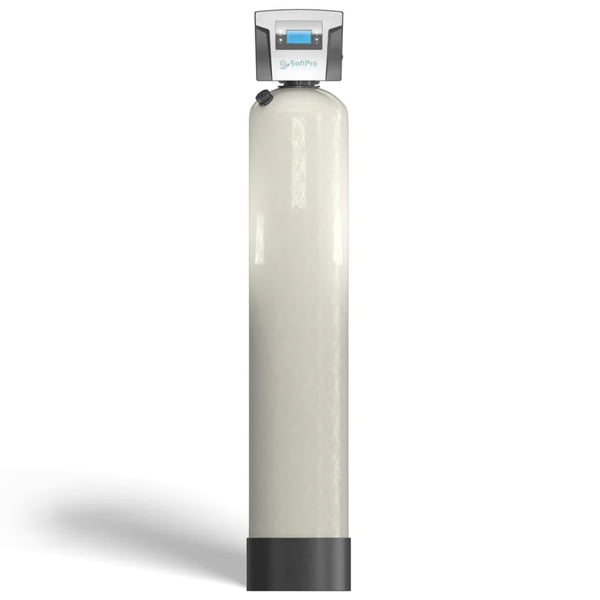
SoftPro Whole House Alkaline Water Filter |
|
| Price: | $$$ |
| Filter Type: | Calcite |
| Feed Water pH: | 5.5+ |
| Output Water pH: | ~7.0 |
| Water: | 5-10+ Gallons Per Minute |
|
Our Rating
|
|
Pros
- The SoftPro alkaline whole house filter eliminates acidity in the pH range of 5.5 to 6.9.
- Calcite-based.
- Prevents corrosion of plumbing system including pipes, fixtures, and appliances.
- Automatically backwash out trapped sediment to prevent water pressure drops.
- Choose between 3 sizes to meet your water demand:
- 1.5 cubic feet media for 5-7 gallons per minute flow.
- 2.0 cubic feet media for 8-10 gpm.
- 2.5 cubic feed media for 10 or more gpm.
- Easy installation also thanks to bypass valve.
- NSF-certified control valve gives you full access to system settings.
- Save water adjusting backwash and rinsing cycles as needed.
- Simple LCD display.
- Vacation mode.
- Check and add new calcite media as needed.
- Lifetime warranty on valve and tank.
- 100% money-back guarantee for 6 months after purchase.
Cons
- Most expensive system.
- Calcite adds to water hardness.
Best for
The SoftPro pH Neutralizer Calcite Water Filter is best if you don’t mind paying a bit extra for NSF-certified components.
6. Best for Alkalinization + Remineralization: Crystal Quest Whole House System
The Crystal Quest not only makes your water more alkaline, it also mineralizes it using a blend of magnesium oxide, calcium oxide, white ceramic balls, tourmaline balls, and infrared balls. According to the manufacturer, this mineralization of water provides several health benefits such as reduction of bodily acids.
Pros
- Whole house alkaline filter system is made in USA.
- Media blend of calcium and magnesium carbonates and other minerals like zinc slowly dissolve into the water increases pH levels and neutralizing corrosiveness.
- Recommended to enhance pH and alkalinity in acidic water.
- Prevents corrosion of fixtures, pinhole leaks in pipes, and blue copper staining or rust staining.
- Prevention of copper, lead, iron, manganese and other minerals leaching into your water also improves waste aesthetics.
- Two system sizes and flow rates to choose from:
- 1.5 cubic feet resin for 9-11 gallons per minute flow rate and 1 million gallons capacity (up to 3 bathrooms).
- 2.0 cubic feet resin for 10-13 gallons per minute flow rate and 1.5 million gallons capacity (up to 6 bathrooms).
- You can do the installation yourself if you are handy with tools.
- Choose between automatic, manual, or no backwash. No or manual backwash is cheaper, but we wouldn’t recommend it in order to prevent media channeling.
- 1-year limited warranty.
Cons
- Adds to water hardness.
- No pH range provided.
Best for
The Crystal Quest whole house system is best if you want alkaline water that’s also full of various minerals beneficial for direct consumption.
7. Best Cartridge-Based: Crystal Quest Big Blue Alkalizing Whole House Water Filter
If you live in a small home and prefer cartridge-based whole house alkaline water filters, the Crystal Quest might be just what you are looking for!
Pros
- Made in USA.
- Blend of calcium carbonate will alkalize and remineralize your water. Mineral and infrared balls ionize water.
- Also increases water pH level.
- Optional SMART filter cartridge uses a mixture of KDF, activated carbon, and ion exchange to remove all sorts of water contaminants such as lead and chlorine. Ceramic and tourmaline balls further enhance water pH and alkalinity.
- Optional carbon block filter removes VOCs, pesticides, and more harmful water pollutants.
- Without or with stand in case you don’t want to wall-mount.
- One alkaline filter cartridge lasts 12-18 months. Estimated yearly cost: $241.00.
- 1 year warranty.
Cons
- 4-6 gpm water flow rate is really only for 1-2 person households.
Best for
Crystal Quest’s Big Blue whole house alkaline filter system is best for very small homes who don’t have the space to install a larger system and don’t mind filter cartridge replacements.
- Our List of Best Rated Whole House Water Filters
- The Best Whole House Hard Water Filter Systems
- BOS Compares the Best Rated Whole House Carbon Water Filtration Systems
- Whole House City Water Filter Comparison and Reviews
- These Are the Best Rated 2 and 3-Stage Whole House Filters
- These Are the Best Alkaline Under Sink Water Filtration Systems
- List with All Whole House Water Filters Featured on BOS
Comparison List
How do the best whole house alkaline water filter systems perform when directly compared?
(Mobile Hint: Swipe to Scroll)
| Model | Price | Filter Type | Feed Water pH | Output Water pH | Water | Additional Info |
|---|---|---|---|---|---|---|
| SpringWell SCN1-6 Calcite pH Neutralizer | $$ | Calcite | 6.0+ | ~7.0 | 12 Gallons Per Minute | |
| USWS Matrixx pH Balancing Backwashing Filter System | $$ | Calcite + Magnesium Oxide | 5.0+ | ~7.0 | 10-20 Gallons Per Minute | |
| US Water Precision Injection pH Balancing System | $$ | Soda Ash Injection | Any | Any | 1-50 Gallons Per Minute | |
| Flexx Pro Series Backwashing pH Neutralizer Filter | $ | Calcite + Magnesium Oxide | 5.0+ | ~7.0 | 10-20 Gallons Per Minute | |
| SoftPro Whole House Alkaline Water Filter | $$$ | Calcite | 5.5+ | ~7.0 | 5-10+ Gallons Per Minute | |
| Crystal Quest Whole House Water Alkalizer System | $$ | Alkaline + Remineralization | Any | Not Specified | 9-13 Gallons Per Minute | |
| Crystal Quest Big Blue Whole House Alkaline Water Filter | $ | Alkaline + Remineralization | Any | Not Specified | 4-6 Gallons Per Minute |
Buying Guide: How to Choose the Whole House Alkaline Water Filtration System That’s Best for You
The following are key features worth considering when shopping for a whole house alkaline water filter. They will help you choose the right on for your needs and budget.
Type of Filter and Water pH
When it comes to alkaline water filters, there are different filter types for different feed water pH levels.
Calcite filters are the most common type and are appropriate for feed water with a pH of 6 or above. These filters utilize a tank containing calcite (calcium carbonate) which dissolves calcite into water as it passes through. Refilling the calcite is required as it dissolves into your water, the frequency of which depends on your water’s pH level and how often you use the filter. Some calcite filters require backwashing to flush out accumulated sediment and prevent channeling – which occurs when holes form in the media bed and water begins to flow around rather than through the media.
At a pH level between 5 and 6, a mixture of calcite and magnesium oxide is typically used. The lower the pH level, the more magnesium oxide there should be. Magnesium oxide works in the same manner as calcite, in that it releases magnesium into your water as it flows through the filter.
For very low pH levels below 5, a soda ash injection system is the preferred filter type. This system works slightly differently than the two types described above, in that it directly injects a preset level of dissolved soda ash into the water stream. A pump is used to control the level of soda ash injected based on the flow rate of your (well) water.
Flow rates
Flow rate refers to the total capacity of an alkaline filter to process water at one time. Whenever you’re considering a whole house system, flow rates are important to keep in mind as too low a flow rate will lead to low-pressure issues when running multiple outlets at once.
Flow rates are measured in gallons per minute (gpm), but many manufacturers will also provide a figure for the number of bathrooms the system can provide for.
A whole house alkaline filter system for a larger home with 4 to 6 bathrooms will need at least 10 to 15 gallons per minute.
Contaminant Removal
Standalone alkaline filters do not remove any contaminants from water. Instead, they simply release a pH-raising compound like calcite, magnesium oxide, or soda ash.
Other systems include additional stages to remove a variety of contaminants before the alkalizing filter stage.
For example, sediment filters are typically used as a preliminary filter stage to remove sand, silt, dirt, and sediments before they can clog the later filter stages. Activated carbon filter stages are used to remove VOCs, pesticides, industrial solvents, and disinfectants like chlorine and chloramine among other things.
Installation & Maintenance
When it comes to installation, most whole house alkaline water filters can be installed on your own provided you have basic DIY and plumbing knowledge. Some systems come with bypass valves, while others do not.
As far as maintenance is concerned, most basic tank-based systems only require periodic refilling of the media as needed. Cartridge-based systems will require periodic replacement of the filter cartridges.
Warranty
Whenever you’re considering investing significant money into a whole house filter, a good warranty is something to look out for. The systems reviewed above feature a variety of warranty types, everything from one year to limited lifetime warranties.
Cost
Whole house alkaline water filters tend to be on the cheaper side when it comes to POE water filtration. Cheaper units can be purchased for just $500, while higher-end systems cost between $1,000 and $2,000.
More on Whole House Alkaline Water Filters
What Is a Whole House Alkaline Water Filter and How Does It Work?
A whole house alkaline water filter is a device designed to raise the pH of your home’s water supply. These systems will process all of the water coming into your home, so you’ll have neutral or alkaline water coming from every faucet, showerhead, and outlet.
Whole home alkaline filters are typically used with water supplied by a well, as well water is significantly more likely to have a low (acidic) pH than municipal water.
About Water pH
Put simply, water pH is a measure of how acidic or basic it is. The higher the pH level, the more basic the solution, the lower the pH level, the more acidic. A pH level of 7 is considered neutral – neither acidic nor basic.
When it comes to drinking water, the EPA recommends a pH level of 6.5 to 8.5. This is generally a good recommendation, although there are exceptions to this, namely reverse osmosis water which tends to be slightly more acidic due to its exceptionally low level of minerals and dissolved solids.
Types of Whole House Alkaline Water Filters
As mentioned above, there are three primary types of whole house alkaline water filters. The ideal type for you will vary depending on how low your water’s pH level is.
- The most common filter type uses naturally occurring limestone calcite to impart calcium carbonate in water as it flows through the filter media. This filter type is appropriate for pH levels above 6.
- For pH levels between 5 and 6 a mixture of calcite and magnesium oxide is used to increase pH. The lower the pH level, the greater the proportion of magnesium oxide to calcite is used.
- Lastly, for very low water pH levels of less than 5, an injection system using soda ash is typically used. These multi-stage systems first dissolve a set amount of soda ash in water, and then inject it into your main water pipe whenever your well is active.
Benefits: Why Do People Use Whole House Alkaline Filters?
There are several concrete benefits to raising the pH of water in your home, as well as some more questionable claims about the health benefits of alkaline drinking water. Let’s examine these one at a time.
Protecting Your Pipes, Fixtures, and Appliances
Acidic water has the potential to corrode pipes and fixtures eventually causing pinhole leaks. Pinhole leaks are tiny pin-sized holes that can develop in copper pipe over time when it’s exposed to acidic water for a long time.
Acidic water can also cause damage to household appliances like dishwashers and washing machines – prematurely reducing their lifespan.
This danger can be entirely eliminated if you balance the pH of acidic water to around 7.
No More Staining
Corrosive acidic water can also cause leaching from your metal plumbing. This occurs when acidic water eats away at the inside of your home’s pipes and imparts water with dissolved metals.
- Copper pipe will give water a blue-green color – which will stain sinks, bathtubs, countertops, and even laundry.
- Iron pipes will create rust-colored stains in your sinks and other fixtures.
- And if your plumbing still contains lead, the heavy metal will contaminate your water posing a serious health threat.
Better-Tasting Water
Not surprisingly, metal leaching from piping will not only lead to stains and pinhole leaks but will also impart an unpleasant metallic taste in your drinking water.
Besides, leaching from metal pipes can greatly increase the copper, lead, and zinc content in your water – which can lead to a host of health problems.
Increasing the water’s pH level using an alkaline filter will resolve each of the above issues.
Claimed Health Benefits of Alkaline Water
While the above-mentioned issues are well-documented benefits of increasing your water’s pH level, there are also several claimed health benefits about alkaline water that may or may not have any validity to them.
It’s important to note that there is little to no solid scientific research on the health claims of alkaline water.
Let’s take a look at these claimed benefits one by one.
Balancing Bodily pH Levels
Your body’s pH level is naturally maintained at or near a neutral pH level of 7. Proponents of alkaline water claim that drinking alkaline water will balance your body’s pH level from acidic to neutral, but there is no solid evidence for this. Your body has natural mechanisms for regulating its pH level, including excreting more acid through urine and breathing out more carbon dioxide.
In fact, when you drink alkaline water, it is quickly neutralized by your stomach acid.
Improved Hydration
There is no evidence that alkaline water offers improved hydration over any other type of water. Hydration is a function of how much water you drink and is not significantly affected by pH levels.
Improved Digestion
Proponents of alkaline water claim it can improve digestion by altering the pH levels of your body. This is not likely to be the case, as your stomach quickly neutralizes the pH of alkaline water on contact.
Improved Skin Health
Improved skin health through increased absorption of essential nutrients is another claim made by alkaline water advocates. Again, there is no scientific research to back this up, but hydration in general does improve the appearance of our skin.
Stronger Immune System
Another health claim made by alkaline water supporters is that it acts as an antioxidant in the body, boosting the immune system. Once again, no scientific evidence to date has backed this claim.
Anti-Aging
Lastly, anti-aging through the antioxidant effect of alkaline water is another claimed benefit. While it’s true that staying hydrated will help you look healthy and fit, there is no evidence that alkaline water does this better than any other water.
Frequently Asked Questions (FAQ)
- Are there whole house water filters that make alkaline water?
There are whole house water filters that balance the pH level of acidic water making it neutral. And there are whole house filters that make water alkaline. - Is alkaline water better for you than filtered water?
Not necessarily. Filtered water contains fewer contaminants which protects your health. The claimed health benefits of alkaline drinking water need yet to be confirmed by scientific research. - What are the disadvantages of a whole house alkaline water filter?
Depending on the type, many whole house alkaline water filtration systems use minerals that make water hard. Also, these minerals need to be refilled from time to time. Lastly, the proclaimed health benefits of alkaline drinking water are yet to be confirmed. - Which is better reverse osmosis or alkaline water?
Reverse osmosis water is almost pure. It doesn’t contain any potentially harmful contaminants which is great. Whether or not alkaline water really has any health benefits remains to be proven. - How often do you change whole home alkaline water filters?
Filter cartridges need to be replaced about once a year. Tank-based systems need to be replenished every 1-2 years, depending on your water pH and usage.
Questions? Ask away!
Information provided on BOS is for educational purposes only. The products and services we review may not be right for your individual circumstances.
We adhere to strict editorial guidelines. Rest assured, the opinions expressed have not been provided, reviewed, or otherwise endorsed by our partners – they are unbiased, independent, and the author’s alone. Our licensed experts fact-check all content for accuracy. It is accurate as of the date posted and to the best of our knowledge.

